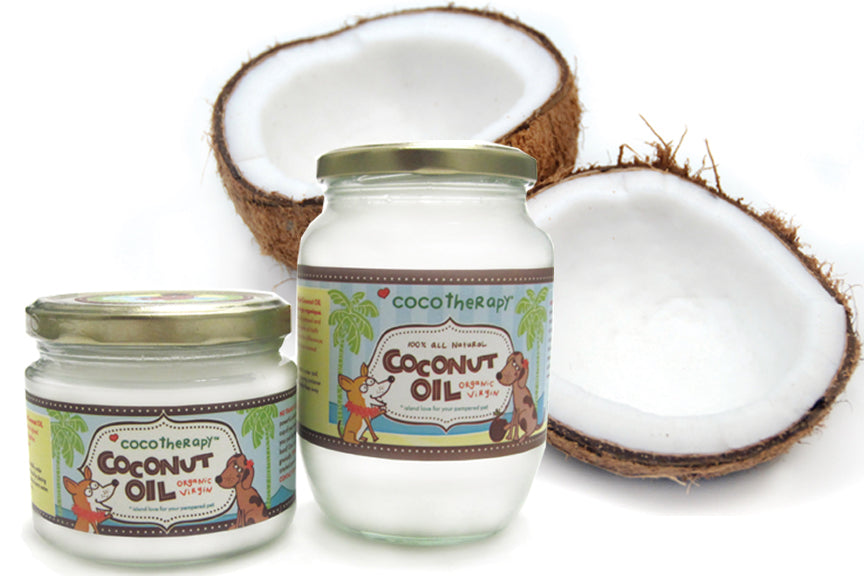As one of nature's true superfoods, coconut oil offers countless health benefits for both pets and people. Previously on the blog, we've looked in detail at some of the many ways that coconut oil can support your pet's overall health and protect them from illness.
In this first blog post of 2019, we'd like to take the opportunity to remind you of just some of the many ways that coconut oil can help your pet live a longer, happier, and healthier life. Keep reading for 11 of our favorite health benefits of coconut oil and some practical tips for using it with your pets.
1) It Keeps Skin Healthy
Skin conditions are one of the most common health complaints in pets. They're very uncomfortable, and can lead to incessant scratching and chewing of the irritated area. Skin problems are often caused by allergies; especially to the saliva of fleas, ingredients in food, and environmental allergens such as pollen.
Applying coconut oil to irritated skin can work wonders for skin conditions. Many pet owners have reported vast improvement of rashes, hot spots, and sores. Coconut oil can even clear up bald spots caused by trauma to irritated skin. It is also rich in vitamin E which is essential for healthy skin growth and repair of skin damage.
If your pet is suffering from a skin condition, massage coconut oil directly on the affected area several times a day. It's also beneficial to put additional oil in your pet's food. Skin conditions respond more quickly when the coconut oil has a chance to attack the problem from both inside and outside the body.
2) It Nourishes the Coat
Did you know that a dull coat and excessive shedding are signs of poor health in pets? Applied topically, coconut oil nourishes your pet's coat making it smoother, shinier, and less prone to shedding.
Added to your pet's diet, it boosts the immune system and provides digestible fats essential to skin and coat health. Coconut oil also aids in the absorption of minerals and fat-soluble vitamins thereby improving overall health, and working wonders for your pet's vitality and appearance.
3) It Promotes Digestive Health
Adding coconut oil to your pet's diet is extremely beneficial for their digestive health. Unlike other fats, coconut oil is directly absorbed into the GI tract and turned into usable energy. The medium-chain fatty acids (MCFAs) in coconut oil also help the body to absorb the nutrients and vitamins from food more efficiently.
In addition, coconut oil can help eliminate parasites, fungi, and bad bacteria in your pet's digestive tract thanks to its anti-microbial properties. The oil also acts as a natural anti-inflammatory, and helps heal injuries in the digestive tract and prevent chronic inflammation.
4) It Boosts the Immune System
Lauric acid in coconut oil is converted into a molecule called monolaurin in the body, which effectively kills disease-causing microorganisms without destroying beneficial bacteria.
Monolaurin protects the immune system, helping pets to maintain good health and quickly fight off disease when it strikes. This is especially important for older pets as their immune system naturally weakens with age.
The immune-boosting super ingredients in coconut oil also help protect your pet against allergic reactions caused by an overactive immune system. And the antimicrobial and anti-inflammatory properties of the oil promote healing of allergic symptoms such as hives and hotspots.
5) It Protects Bones and Joints
Coconut oil can be added to your pet's diet to protect their bones and joints. When food is taken together with coconut oil, the body can more easily absorb vitamins and minerals such as calcium and magnesium that are essential for bone and joint health.
Virgin coconut oil also functions like an antioxidant, inhibiting the destructive action of free radicals that can contribute to joint and bone conditions such as arthritis. This combination of improved mineral absorption and protection against damaging free radicals promotes strong, healthy bone and joint growth in pets.
For pets with existing bone and joint conditions, virgin coconut oil helps lubricate joints. It also acts as a natural anti-inflammatory due to its high lauric acid content. And thanks to coconut oil's antibacterial, antifungal, and antiviral properties, it protects against painful conditions caused by infections in the joints.
6) It Helps Maintain Your Pet's Oral Health
Coconut oil is rich is lauric acid and caprylic acid – medium-chain fatty acids (MCFAs) that have antibacterial, antiviral, antifungal, and antimicrobial properties. This makes it very effective for maintaining your pet's oral health.
The simplest way to brush your dog's teeth is by applying a small amount of coconut oil to a moistened piece of gauze, then brush with gentle motions to clean the teeth and gums. Your dog will love the sweet taste of the oil, and the gauze will make the task of brushing a whole lot easier!

7) It Supports Brain Health
The brain uses glucose as its primary source of fuel. As pets age, they become more susceptible to developing a defect in glucose metabolism. This can cause Cognitive Dysfunction Syndrome (CDS), which is similar to Alzheimer's disease in humans.
Supplementing your pet's diet with a high-quality virgin coconut oil can raise blood ketones (an alternative fuel to glucose) to levels that can support brain growth and development and prevent degenerative processes that lead to pets developing CDS.
8) It Protects the Liver
The MCFAs in coconut oil are immediately transported from the digestive tract into the liver without needing bile to be metabolized. They are then used for energy rather than being stored in the body like other types of fats. The conversion of MCFAs into energy is thought to benefit the liver by reducing its workload and preventing fat accumulation.
MCFAs also have antimicrobial properties that enable them to destroy harmful viruses which can attack the liver causing infection or hepatitis. In addition, they protect the liver from free radical damage and prevent tissue injury, enabling liver regeneration while supporting the immune system.
And because coconut oil has anti-inflammatory properties, it can help reduce the inflammation and swelling that's usually associated with fatty liver disease.
9) It Helps Fight Infection
The MCFAs in coconut oil have been shown to effectively kill potentially harmful microorganisms such as bacteria, viruses, fungi, and parasites. MCFAs are completely harmless to pets and people, and are actually used by the body as a source of energy.
Some of the most common sites of infection in pets are the skin, ears, eyes, and mouth. Coconut oil can be used both orally and topically to protect against infection and treat symptoms such as itchiness and inflammation.
10) It Naturally Detoxifies
Toxins can build up in your pet's body, increasing their 'toxic load'. Over time, this toxic load can become too heavy for your pet's body to manage – putting them at risk of developing chronic health conditions.
Therapeutic coconut oil is a medium-chain fatty acid that helps reduce your pet's toxic load and naturally supports the body. Its detoxifying effects are especially beneficial for promoting digestive and immune health.
11) It Supports Your Pet's Overall Health
Introducing your pet to coconut oil is a great way to take care of them and ensure they live the longest, happiest, and healthiest life possible.
In order to enjoy the health benefits of coconut oil, always remember to choose a high quality, therapeutic-grade oil such as CocoTherapy coconut oil. Our oil is sourced from our USDA-certified organic family farm in the Philippines, and carefully manufactured in our own facility. In addition, be sure to always feed your pet coconut oil in moderation as part of a balanced, species-appropriate diet.
For more information about supporting your pet's overall health with coconut oil, please check out our previous post, How to Use Coconut Oil With Your Pets.



